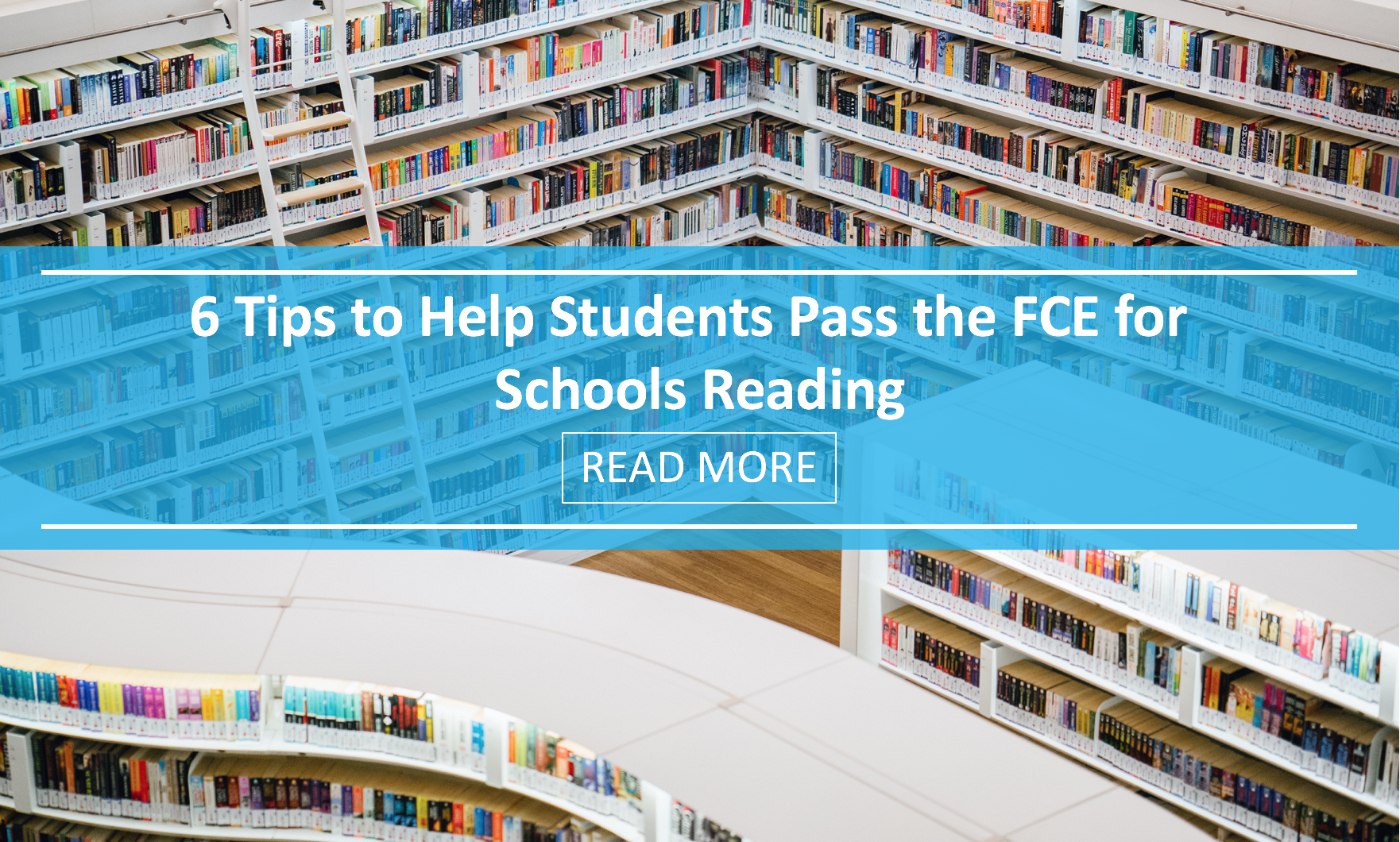6 Tips to Help Students Pass the FCE for Schools Reading


However, many teachers presume that just because the topics have been made more likable in terms of content and theme that they’re also fewer types of writings that can be chosen. This in fact is not so, and teachers and students alike can still expect to find the usual writings such as a formal letter, informal letter, an article, an essay, a report, a review, a summary, and also the newly included blog entry (which is not found in the general FCE exam).
Just because the topics are easier in terms of younger students being able to understand what is expected to write, it doesn’t mean that the examiners are going to be easier with their grading system. They’re still looking for the same criteria including accuracy, fluency, register and range in grammar and vocabulary and to gain full marks a student needs to demonstrate all of the abovementioned to a high degree.
The main differences in the writing exams other than the inclusion of the blog writing are the timing and word limits. Students are still expected to write the same number of writing pieces as in the general exam, which is 2, however, the timing has been cut from 2 hours to 1 hour and 20 minutes. The word limit is also less and students are expected to write between 120-180 words as opposed to 180-220 words. Some teachers are under the impression that the first task, which is compulsory, is worth more than the second part where the students are allowed to choose the question – this results in teachers spending too much time on the first part and not enough on the second part, however, very few realize that both part one and two are worth exactly the same marks. As the FCE for schools is still a relatively new exam, there’s very little practice in terms of past papers for students, however, there are a few tips that teachers can follow in order to ensure students write as well as they can in the exam.

Generally speaking, it is known for students do better when they like a particular topic and therefore, when they choose the optional writing they will make their decision based on this whether the question is easier or not which is why it’s important for students to practice answering all types of writing. However, it’s common that teachers often choose only a few types of writing as they know that they will all come up, but they don’t take into consideration that the actual question may not suit all students thus limiting the student when it comes to writing well.
Teachers will often write up a short plan for the first 2-3 writings that a student does and then all of a sudden expect them to write essays based on no plans. Because younger students have less experience in writing than older, who have been through more formal education such as college where the demands for writing is much higher, they need more guidance. Teachers need to help students learn how to write a brief plan in order to brainstorm what they want to include in their writing within just a few minutes. It will also help them follow guidelines correctly and fulfill all criteria including demonstrating a good range in vocabulary and grammar (something which they are marked on).
Teaching your students to underline the key areas of the question will also help them to plan their writing properly and ensure that all areas of the question are answered. Perhaps students would argue that their plan wastes too much time, however, if done briefly and quickly, it is not and in a matter of fact the time of 1 hour 20 minutes has been given taking planning into consideration. Step up and challenge them to draft a quick plan in two minutes – a challenge and a sense of uncertainty in another’s voice will likely push them to prove you wrong.
One of the areas that younger speakers usually lose marks on in the writing is their tone or register. This is mainly evident in more formal letters and pieces of writing as students of this age may not have ever had to write a real formal piece of writing.
Students would benefit here from reading examples with the same kind of writing using both formal and informal tones. The teacher can express who the letter is addressing – is it inviting their friend to an event or a VIP? Who do we need to be more polite with? Students then can benefit from underlining the differences between the texts. Alternatively, after discussing which tone is more appropriate, the teacher can give them a sample letter/piece of writing with the opposite tone and correct the mistakes. After continuous practice, writing and using the correct terms according to the correct register will become automatic.
While most students know the basic ‘linking words’ and connectors and have learned the more advanced ones they fail to use them when it comes to writing, which in turn could see them not gaining as many points as they could. Have students practice placing appropriate linking words in gaps. At first have students do the gap-fill exercise with given words and then finally have them choose appropriate linkers without the given words – essentially what you are doing here is guiding them from more controlled exercises to freer ones. Encourage and challenge students to write as many different linkers as possible or set challenges stating they have to demonstrate a certain number. The more they practice the more they will feel comfortable using different ones. This is a great skill to use as it will also benefit students in other areas, especially the in the Use of English section. It’s important for students to understand that they are able to get better marks in writing depending on the range of language they use.
This is one of the most difficult things for students to grasp – no matter how many times you tell a student not to count their words, they do it. Unfortunately, for all students taking Cambridge exams there is a word limit that should generally be adhered to as the questions asked are designed to be answered in that number of words. Counting words, however, can create unecessary stress and cause students to spend too much time on a question. When students practice for the exam, have them practice adhering to the word limit (counting after they're finished to see how close they came, not while they're writing) so they can get an idea of what that general word limit looks like. Also focus on helping students avoid issues such as going off-topic or waffling, both elements that can cause them to lose points in their responses.
Examiners are trying to differentiate the good students from the excellent ones and the writing section is usually the section that will allow them to do so. It’s not uncommon for texts to accompany the questions and the biggest mistake that students who are less experienced in writing under exam conditions make is lifting whole chunks from the text and using them in their writing. This will automatically cause them to have points deducted and it’s possible they could lose quite a few marks in doing so. While ‘lifting’ as such is not allowed, it’s possible to extract information and reword it – in others paraphrase the words to make it sound and look different. Start off small by using PowerPoint and ask your students to find which part of the texts can be extracted and used in their final piece. Next underline the sections and show them an example of paraphrasing through use of vocabulary and word order and structure. Have the students practice the same things throughout the rest of the text and finally have them insert it into their own writing.
It’s imperative as their teacher to equip them with enough knowledge and skills to plan a good piece of writing to ensure they’ll be able to write well on the day of the exam. Writing is an important skill that should not just be learned in order to pass exams, but it also will be prominent in their everyday lives in the future which is why teachers should not only teach in a systematic test-taking way, but also in a communicative manner using relevant and realistic examples.